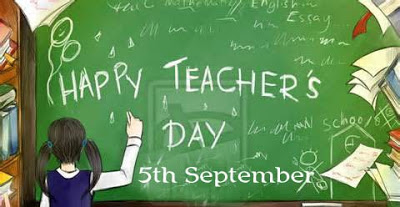National Teachers day commemorates the birth anniversary of Dr. Sarvepalli Radhakrishnan
Since 1962, 5th day of September is celebrated as National Teachers Day, in remembrance of the Birth Anniversary of the second President of India Dr. Sarvepalli Radhakrishnan, who was born on the same day in the year 1888.
This is a day of celebrations in schools across the country to honour and appreciate teachers for the contributions by conducting cultural programmes, fun filled activities by their students. Many state governments presents awards to the teachers of highest value in recognition of their services as teachers.
National Awards to Teachers
The National Award to Teachers are given by the President of India on 5th September (Teacher’s Day) every year to give public recognition to meritorious teachers working in primary, middle and secondary schools.
From 2001, ‘Special Awards’ have been instituted for teachers promoting inclusive education in schools and the education of children with disabilities in regular schools. The total number of ‘Special Awards’ are 43. ‘Special Awards’ are conferred on the teachers of following categories:
- Teachers with disabilities working in mainstream schools.
- Special teacher or trained general teachers who have done outstanding work for Inclusive Education.
Trivia – Some of his students and friends approached him and requested him to allow them to celebrate 5th September, his “birthday”, when he became the President of India.
Dr. Radhakrishnan in response said, “instead of celebrating my birthday separately, it would be my proud privilege if September 5 is observed as Teachers’ day”.
His response shows the love he had for the profession of teaching. From then onwards this day is celebrated Teachers day in India.
Dr. Sarvepalli Radhakrishnan
- 2nd President of India, 1st Vice President, Indian Philosopher, Teacher and a statesmen
- His philosophy was based on Advaita Vedanta Philosophy, Played an important role in reinterpreting Advaita Philosophy for the better understanding of present day society.
- Defended Hinduism against Uninformed Western Criticism.
- He is considered as a bridge builder between India and West.
- Awarded Knighthood in 1931, the highest Civilian award of India, Bharat Ratna in 1954, and honorary membership of the British Royal Order of Merit in 1963.
- He believed that “teachers should be the best minds in the country“
- First person to be awarded Sahitya academy fellowship (The highest honour conferred by the Sahitya Akademi on a writer) in 1968
- Recipient of the Templeton Prize in 1975, a few months before his death, for advocating non-aggression and conveying “a universal reality of God that embraced love and wisdom for all people.”





